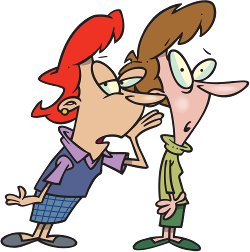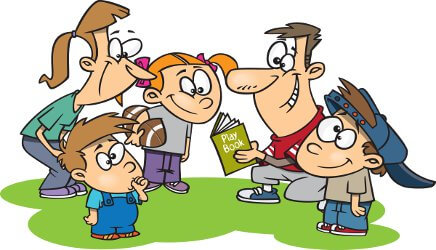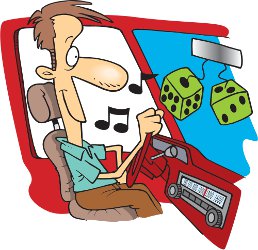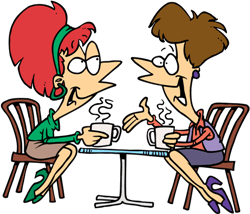Separable and
Inseparable Phrasal Verbs

Maggie tells Edna a secret, but Edna doesn't believe her.
She thinks it's not true.
Edna says, "Oh, that's not true! You made that crazy story up!"
Or, she can say, "That's not true! You just made up that crazy story!"
Click Here for Step-by-Step Rules, Stories and Exercises to Practice All English Tenses
In English, there are lots of actions that we can only express using phrasal verbs. These are verbs with a preposition or adverb that have a special meaning.
These verbs are very important in English, and you must do lots of practice and review to learn them and how to use them correctly.
The best way to learn phrasal verbs is to study them in small groups and also to write your own examples. When you see these verbs in context, they will make more sense!
Phrasal Verbs with Objects
Many phrasal verbs are transitive,
meaning that they take an object.
There are special rules for using transitive phrasal verbs! Let's look
at them now.The first important thing to remember is that some phrasal verbs are separable (the verb and the preposition can be separated, putting the object in the middle), while others are inseparable (the object must come at the end because the verb and the preposition must stay together).
"Run into" is an example for an inseparable verb.
"Run into" means to meet someone by chance when you were not expecting to.
Correct: I always run into Molly at the mall.
Incorrect: I always run Molly into at the mall.
Incorrect: I always run Molly at the mall into.

As you see, we cannot separate the words in this phrasal verb. This is why we call it an inseparable phrasal verb.
Some phrasal verbs can be separated when we used them with objects. This means that we have a choice. We can put the object between the verb and the preposition, or we can put the object at the end, just like we do for inseparable phrasal verbs.
"Write down" is an example for a separable verb.
"Write down" means to make a note some information on paper.
We can separate this phrasal verb if we want! Look at the examples below to see how this construction works.
Correct: His students write down everything he says.
Correct: His students write everything he says down.

As you see, we can separate the words in this phrasal verb. This is why we call it a separable phrasal verb.
We will study five common phrasal verbs of each kind. Understand and practice these verbs, their meaning, and how to use them before you go on to other phrasal verbs.
There's no rush! There are lots of phrasal verbs in English, and it's best to practice them gradually.
Now, let's get to it!

Inseparable Phrasal Verbs
Some
phrasal verbs cannot be separated. This means that when we want to use
an object,
it must always come after the complete phrasal verb.This is true when we use a noun (Ellen, the car, our friends, Germany) or a pronoun (him, them, us.) The object must always come after the complete phrasal verb.
1. Get on/off
The phrasal verbs get
on/off talk about entering or exiting a mode of
transportation. These phrasal verbs work for boats, airplanes,
trains, bicycles, and motorcycles. (If we are talking
about a car, we use get
in/out.)Examples:
- Everyone must get
on the plane and fasten their seatbelts before we can take
off.
- Get
off that motorcycle if you don't have a helmet! It's
dangerous to ride without one.
- I had to run to get on the
train, but I made it!
- It was hard for him to get off the boat, because he was feeling a little sick when they reached the dock!

2. Run into
This
phrasal verb means to meet someone by chance when you were not
expecting to. The object (who we met) must always come at the end!Examples:
- This is such a big city! I'm always amazed when I run into
someone I know on the street.
- Melanie said she ran into
Mrs. Dawson last week. Do you remember her? Our fifth grade English
teacher!
- I hope I run into Dr. Borelli at the conference. It would be really interesting to talk about his latest research.

3. Look after
This
phrasal verb means to take care of. We often use it when we are talking
about taking care of children or animals. We don't use it for objects
or projects.The people or pets we are taking care of must come at the end of the phrasal verb.
Examples:
- Could you please look after
my cat while I'm vacation? She's really no trouble.
- Karen loves looking
after her nephew in the afternoon while his father is at
work.
- Lisa and Matthew are going to look after the kids this weekend. They're going to have lots of fun!

4. Run out of
We use this phrasal verb when we had something, but we have used it
all, and now it is all gone.Remember that the item we no longer have must go at the very end of this phrasal verb because it is inseparable.
Examples:
- Oh no, it looks like we've run out of
yogurt. What will I have for breakfast now?
- We had to wait a whole hour with the new client until my
boss finally arrived. It was terrible! Eventually I ran out of
polite things to ask him.
- Chet was having a lovely afternoon drive until he ran out of gas!

5. Put up with
This
phrasal verb means to endure a person or situation that we don't like.
We have to accept the person or situation although we don't enjoy it.Again, the person or situation we find annoying or difficult must come after the preposition in this inseparable phrasal verb.
Examples:
- I am so tired of putting up with
my roommate's sister! She comes over every afternoon and plays loud
music!
- Sometimes we have to put up with
difficult situations at work, but it's important not to get too
stressed.
- Alfred smokes outside so that his co-workers don't have to put up with the smell of his cigarettes.

Separable Phrasal Verbs
Some phrasal verbs can be separated when we used them with objects. This means that we have a choice. We can put the object between the verb and the preposition, or we can put the object at the end, just like we do for inseparable phrasal verbs.However, there is one important thing to remember! If we want to use a pronoun (like him, her, them, us, or it), we must separate the phrasal verb.
For example:
Correct: This is very important information. Please write it down.
Incorrect: This is very important information. Please write down it.
It's also important to remember that if the object is quite long, we usually do not separate the phrasal verb.
It is not grammatically incorrect to separate the phrasal verbs in these cases, but it is much clearer for the listener if we do not separate the phrasal verb.
For example:
Clear: Can I use the car? I need to pick up a friend of mine from summer camp at the airport.
Confusing: Can I use the car? I need to pick a friend of mine from summer camp up at the airport.
Let's look at some examples with five common separable phrasal verbs.
1. Write down
This
phrasal verb means to make a note of something with a pen and paper,
for example. We do not use it for typing or for a general meaning of
writing, such as writing a book. We use it when we are making a note of
some information on paper.We can separate this phrasal verb if we want! Look at the examples below to see how this construction works.
Examples:
- Dr. Watson is an excellent professor. Her students write down
everything she says.
- Yolanda hasn't got any paper, but she needs to write the
number down.
- Olivia has so many ideas! She wants to write them all down before she forgets them!

2. Pick up
This phrasal verb means to go and get someone in your car. It can also
mean to lift something up with your hands.In either case, the object can come in the middle of the phrasal verb or at the end.
Examples:
- Be careful with the puppy! You can pick her up, but she
gets scared very easily.
- Gerald, could you pick up
Cynthia after her ballet lesson? I have to work late.
- Ron is driving to the airport. He's going to pick his daughter up at 8pm. He's excited to finally see her again!

3. Put on
This phrasal verb is used for clothing. Once we have put something on,
we are now wearing it.Since this verb is separable, the piece of clothing we are putting on can come in the middle of the verb or at the end.
Examples:
- It's terribly cold out! Please put your
coat on
before you go out.
- Charlotte is such a clown! She put on a
ridiculous red hat to go to the party. Everyone thought it was very
funny.
- Henry was in such a rush before work this morning that he left without putting his jacket on!

4. Turn down
This phrasal verb means to refuse an offer. The object of this phrasal verb can be the offer itself or the person who has made the offer to us.
Examples:
- My supervisor told me they want to give me a promotion, but
I think I'm going to turn
the new job down.
I'm just too busy with my kids to accept more work right now.
- Ursula won a free trip to the coast, but she turned it down
because her sister is getting married the same weekend.
- Doug proposed to Claire! He sure hopes she won't turn him down.

5. Make up
This phrasal verb means to invent a story or an excuse. We use it when
someone has invented a story that is not true.The story or excuse can come in the middle of the verb or at the end since this phrasal verb is separable.
Examples:
- The children in my afternoon class make up the
most wonderful stories when we have story time! They are very creative.
- I just can't stand Wanda! She always has some excuse for
arriving late, but I think she makes them up.
- Talking to Susan is so much fun. Maybe she makes up half her stories, but they're entertaining anyway.

These were some examples of common separable and inseparable phrasal verbs. Take a few minutes to make your own examples with each of them to help you remember their meanings and uses.
Keep in mind:
- Some phrasal verbs are separable, and others are
inseparable.
- Inseparable phrasal verbs must take the object at the end,
after the preposition.
- Separable phrasal verbs can take the object in the middle,
between the verb and the preposition, or at the end,
just like inseparable phrasal verbs,
- When we use a pronoun with separable phrasal verbs, the pronoun must come in the middle, between the verb and the preposition.
Keep practicing with these important phrasal verbs and be sure to visit
the other pages in this section. Practice makes perfect!
English
Phrasal Verbs Main Page
Separable
and Inseparable Phrasal Verbs
Phrasal-Prepositional
Verbs
Common
Phrasal Verbs

Get Updates, Special Offers, and English Resources
Download your FREE GIFT (the first two chapters of
English Short Stories Book and Workbook)
as soon as you join!

By submitting your email, you consent to receiving updates and newsletters from us and to the sharing of your personal data with third parties for the purposes of sending you communications. We will not spam you. You can unsubscribe at any time. For more information, please see our privacy policy.
Return
from Separable and Inseparable Phrasal Verbs to English Phrasal Verbs
Return to
Really Learn
English Home Page





